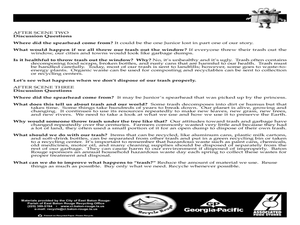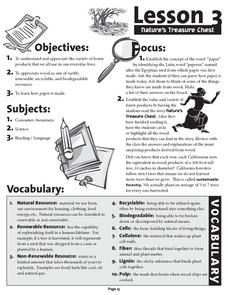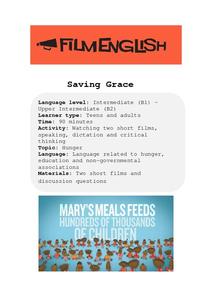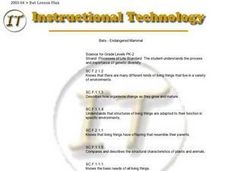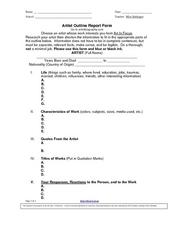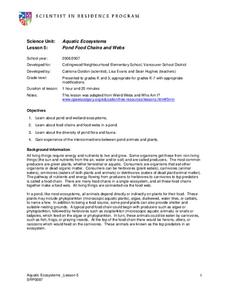Curated OER
Explore the Animal World
Third graders use a variety of resources to do research on an animal. Their final project is a graphic organizer for display and an informative multimedia slide show.
Curated OER
Recycling
Learners relate recycling to waste reduction. In this science lesson, students talk about the environment and how recycling certain natural resources actually saves on energy. They also discuss what type of recycling causes pollution...
Curated OER
The Dirt on Worms!
Fourth graders make predictions, observe, collect and record data. They investigate several soil and worm websites. Finally, 4th graders write a letter to The President which defends earthworms by explaining their value to the United...
Curated OER
Habitat Art: Florida Panthers
Students discover the lifestyles of a Florida Panther by investigating its habitat. In this wild animal instructional activity, students utilize the Internet to research the habits of a Panther and what their habitat is. Students...
Curated OER
I Feel Renewed!
Students participate in a simulation of the equal and unequal distribution of the earth's renewable resources. They discuss renewable resources and how food resources can increase and decrease, participate in the simulation, and analyze...
Curated OER
WHAT'S ORGANIC?
Students explore how certain foods come to be certified "organic." They write the words "organic" and "synthetic" and given the definitions of each. Students are given dictionaries. They are asked: "What is organic food?" Students grow...
Curated OER
Fitting Trash into Yesterday: A Fifth Grade Activity
Fifth graders explore the concept of waste management. In this recycling lesson, 5th graders discover the history of waste management and discuss how the U.S. should respond to the issue of ever-increasing waste.
Forest Foundation
Nature's Treasure Chest
Renewable, recyclable, and biodegradable. As part of their study of the forest ecosystem, class members read "Nature's Treasure Chest" about the many products made from trees and then craft their own recycled paper.
Calvin Crest Outdoor School
Survival
Equip young campers with important survival knowledge with a set of engaging lessons. Teammates work together to complete three outdoor activities, which include building a shelter, starting a campfire, and finding directions in the...
Curated OER
Fused Sentences (Run-on Sentences)
Run-on sentences can be annoying to read, and are a tough habit to break in writing! Fix this problem in your language arts class with this straightforward grammar worksheet. Pupils rewrite fourteen sentences to split run-on sentences...
Curated OER
Invetories Slave owner or not?
Primary source analysis is a great way to bring history to life. Learners examine a series of personal inventories taken from Southern white males who died during the Civil War era. They analyze the documents to determine the social and...
Curated OER
Rejoice, It’s National Poetry Month!
Cultivate an interest and enjoyment of poetry school-wide!
Curated OER
Grammar Worksheet: Lie vs. Lay
To do something to someone or something or not to do something to someone. That is the question. And it is the source of the confusion between lie and lay. The strength of this worksheet is in the clear, cogent explanation for the...
Film English
Saving Grace
Bring up the topic of world hunger in your class with two emotional videos. The short films are about a program for educating and feeding children around the world. Class members talk about poverty and pay close attention to the numbers...
Curated OER
Phineas Gage: Concept Analysis
Prepare for teaching Phineas Gage: A Gruesome but True Story About Brain Science with this written analysis of the book. The analysis includes a summary, considerations for teachers, project ideas, and a list of additional resources that...
Curated OER
Bats - Endangered Mammal
Students complete question sheet on Bats and research information using a list of websites provided by the teacher. They work with peers to complete a scavenger hunt worksheet about bats.
Curated OER
Advanced Art – Cultural Place-setting Still life
Upper graders view a series of films that depict rituals or celebrations as they occur in different cultural settings. They conduct a cultural investigation about one culture, brainstorm and research objects that have cultural or...
Curated OER
Artist Online Report Form
Get those middle schoolers ready for writing excellent reports. This outline provides instructions and organized space to help learners gather information in a thoughtful and useful way. They research the life and works of an artist....
Curated OER
Back-to-School Night: What Parents Need to Know
Get prepared for your Back-to-School Night presentation with these tips and ideas.
Indian Land Tenure Foundation
Native Foods and Livelihoods
Introduce young scholars to the ways in which land and people have a relationship. They examine the types of food local tribes have traditionally consumed and ways in which the people and the land both benefited from the act of...
Curated OER
"Habitats"
Students complete a unit of lessons on animals and animal conservation. They observe a square meter of ground outside the school, set up a model environment, analyze an owl pellet, grow bread mold, and explore various websites.
Curated OER
Somewhere
Second graders write their own version of the book "Somewhere" in this lesson. They listen to the book and locate the rhyming words within the text. They find the number of syllables per word in the text, and compare the number of...
Curated OER
Aquatic Ecosystems
Students study ponds and wetland ecosystems and examine the food chains and webs in them. In this aquatic ecosystems lesson plan students answer questions about the diversity of the flora and fauna in a pond.
Curated OER
Animals
Second graders discuss the term "endangered". They identify the reasons some animals are in danger of being wiped out. They discover ways humans can help the species survive.
Other popular searches
- Living and Non Living Things
- Living and Non Living Things
- Living vs Non Living Things
- Living Non Living Things
- Living Non Living Things
- Laving and Non Living Things
- Living Non Living Organisms
- Living vs. Non Living Things
- Living vs Non Living Things
- Lving and Non Living Things
- Living, Non Living Things
- Living/non Living Things








